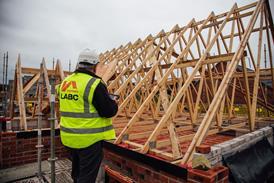The governmentŌĆÖs Comprehensive Spending Review will see construction output outperform the UK economy for the first time since 1989, according to figures compiled by Deutsche Bank.
The statistics show that by 2002, the difference between the annual increase in construction output and the annual change in GDP will be in favour of construction.
The figures, obtained by ║├╔½Ž╚╔·TV, coincide with upbeat forecasts from industry analyst Hewes & Associates and the Construction Products Association. Both have predicted that construction growth will hit 3% in 2002.
The factor prompting the analysts to upgrade their expectations is chancellor Gordon BrownŌĆÖs spending review. Without it, the building gap in 2002 would have stayed at the 2001 figure of ŌĆō0.6%.
According to government figures there will be ┬Ż1bn more worth of construction work in 2002.
Deutsche Bank building analyst John Messenger said the figures showed that the construction sector was at last becoming a leading industrial sector in UK plc.
He said: ŌĆ£Hopefully, we have reached a nadir as to how low the sector can go. If you look at the last nine-to-10 years, government spending has usually been cut. The government has now realised that to be a successful economy you have to have the best infrastructure.ŌĆØ
The CPA figures predict a steadily increasing rate of growth over the next three years, with output rising 2% in 2000, 2.5% in 2001 and 3% in 2002.
The government has realised the economy has to have the best infrastructure
John Messenger Deutsche Bank analyst
CPA president Roy Harrison said the governmentŌĆÖs spending review was long overdue. He said: ŌĆ£For too many years, the proportion of GDP invested in the UKŌĆÖs infrastructure has been the lowest in Europe and this additional funding will at last start the long process of catching up with our European colleagues.ŌĆØ
Hewes & AssociatesŌĆÖ Construction Output 2000 report said the rise in public sector work would make up for a drop in new work, which it expects to fall 2% in 2000 after a 9% fall in 1999.
The report said: ŌĆ£It is this factor [the spending review] that will drive growth and prevent the industry moving into recession over the next year or so.ŌĆØ It added that a question mark hung over how quickly the extra funding would feed through to the market. It concluded: ŌĆ£One should not get too carried away when reading headlines about massive spending increases.ŌĆØ
HewesŌĆÖ report offered gloomy prospects for private housing ŌĆō starts are set to fall from 160 000 in 2000 to 150 000 in 2002 ŌĆō and for industrial construction, which will decline 20% over the course of 2000-2001.
The outlook for repair and maintenance was more optimistic, with growth of 12% expected between 2000 and 2002.
The Deutsche Bank figures were welcomed by the industry. A spokesperson for Amec said: ŌĆ£We certainly hope that the growth in the public sector is faster than GDP. ItŌĆÖs not before time.ŌĆØ
The spokesperson pointed to the recent weakness of the public sector market, adding that even private finance initiative projects had been slow to get off the ground.
Downloads
The ║├╔½Ž╚╔·TV Gap
Other, Size 0 kb






















